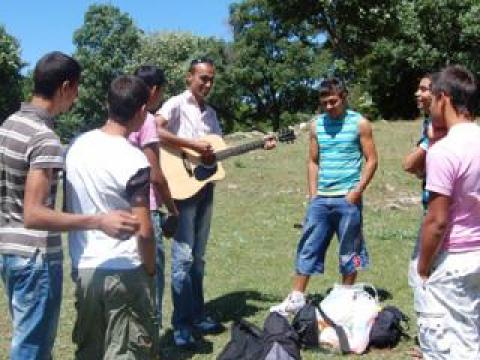Life project encourages street working children to become agents of change

ALBANIA - For the first time, children and youth from World Vision’s Life project (Children in Crisis – CiC) in the Albanian capital Tirana had the chance to come together as a Life Skills Youth Group and decide what they want to change in their lives, as well as in the community where they live.
Children and youth from among the Roma community in Bregu i Lumit; one of the poorest areas of the Albanian capital Tirana, typically come together as a group on the streets of the city – not to socialise and have fun, but to beg or collect cans to sell. Coming together to learn and make a difference in other’s lives is a completely new experience for them.
...the parents should have the possibility to work while the children must go to school and get educated for life... the families should receive assistance from the state
“If we can contribute to change only five people, we know that we have been good,” said 18-year-old *Albert, in the youth meeting held at Dajti mountain in Tirana.
This initiative was born from a questionnaire given to all the children and youth of the Life Project on areas where they would like to see their lives improved. Having a garden and painted walls, promoting their rights, a clean environment, soccer teams among the children and youth, as well as to complete a computer course, were some of the answers they gave. Now, this newly created Life Skills Group is committed to be the first agent of change in their community.
“By completing the tasks of the questionnaire, the children will have the opportunity to develop their skills and see themselves as main actors for development and promote change for other children in their neighbourhood,” said Brixhida Xheka, World Vision Albania Children in Crisis Team Leader
As part of the activity, the children and youth also had the rare chance to have fun. For the first time they went on a cable car, which they found both a bit scary and enjoyable.
“This was the first time for me to be on a cable car and to come to Dajti mountain,” said Altin* even though this mountain is just twenty minutes away from their neighbourhood. “It was really nice to be here.”
Besides participating in meetings and discussions about new initiatives, they enjoyed different games and playing clarinet (a traditional Albanian musical instrument).
“Today was a very special day; I am very happy,” said Albert*.
At the same time, children were able to talk about different ways to solve the street working problem which has been affecting them since they were young children. According to the Life Skills Youth Group, some of the possible solutions to stop child labour are that “the parents should have the possibility to work while the children must go to school and get educated for life,” “the families should receive assistance from the state,” and “the children should be part of organisations that help them.” Based on observations of the Committee on the Rights of the Child, street children represent the most unprotected category of children in Albania.
In Tirana alone, more than 800 children live as beggars, mobile vendors, shoe polishers etc. A World Vision Albania Quantitative study interviewed some 293 street working children in 2008. The study revealed as many as half of the children start work before the age of 10, with the average working between seven to 18 hours per day. This work not only takes them away from school but also denies their right for participation, protection and health care.
The Life Skills Youth Group will give these children a new perspective on how to create a better environment that stimulates development, enables them to learn and change for a better future. Also, the youth in the project will have the opportunity to attend vocational training courses, which aim to help the youngsters to be integrated in the job market. “Having a very low level of education, we are trying to give these youth job skills that can be learnt by seeing and practicing them, such as hairdressing, hydraulic, electricity, mechanic,” says Robert Stoli, Community Development Facilitator. Part of the initiative is training about life skills and many other activities that will help them to change or improve the areas they identified in the questionnaire.
youth in the project will have the opportunity to attend vocational training courses, which aim to help the youngsters to be integrated in the job market
Life skills is one of the interventions of the Children in Crisis (CiC) project. The CiC project takes a holistic approach, in that it works with youth through life skills, and works with families through case management, parenting and income generation activities. CiC also works with schools and other actors for involving children in formal and informal education and at the same time works with the community to mobilise members to address CiC issues.
“The Life Skills trainings will make the children active in making a change in themselves, their peers and community where they live,” said Stoli. “It encourages the children to develop more their skills and to help the community instead of working in the streets.”
The changes that can be brought in the community will not only benefit this Life Skills group, but also stimulate other children to continue the process of development in the community.
“The change we want to see in the other children is to help them understand that they are someone and they can continue the road of changes by themselves,” concludes *Albert. *The names of the children have been changed to protect their identity.